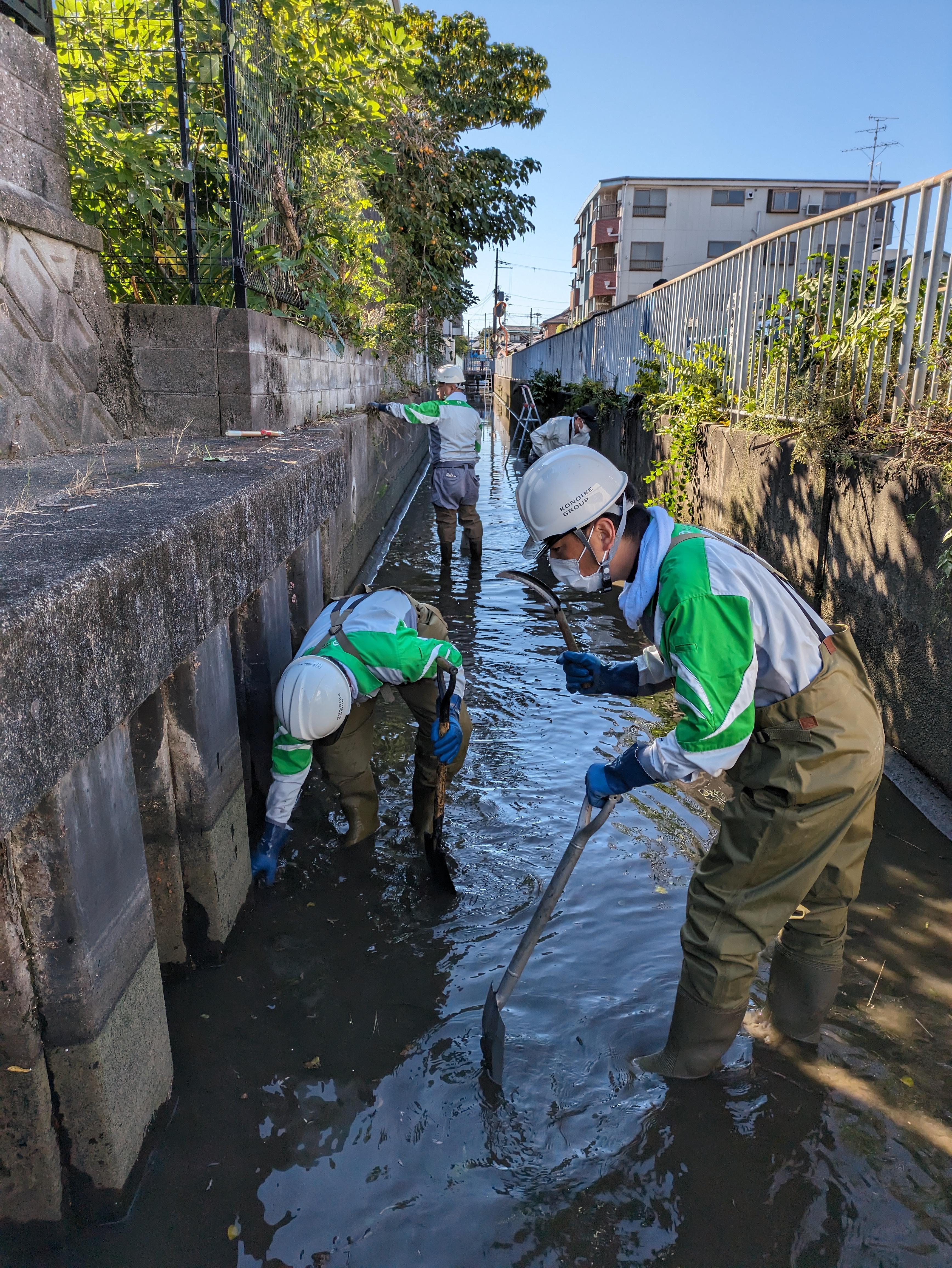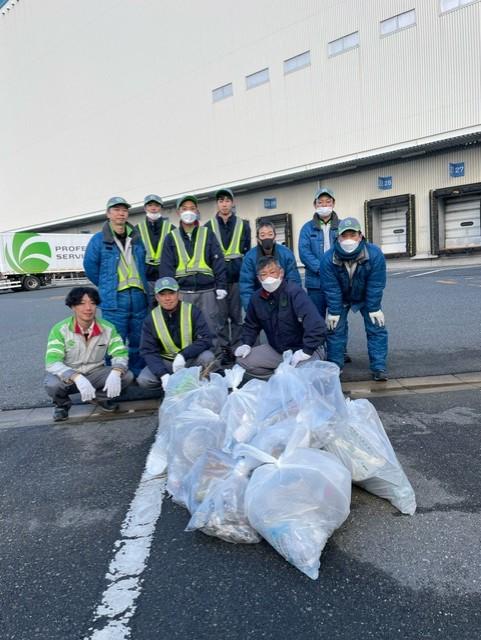Initiatives in Corporate Activities
1. Actions to Prevent Global Warming
We consume a great deal of fossil fuel-derived energy resources, including diesel, gasoline, and electricity. We recognize our serious and sizable responsibility to reduce our CO2 emissions and are working to do so.
Switching to Net-Zero CO2 Electricity
In FY3/2022, the KONOIKE Group began switching to net-zero CO2 electricity. In the Kansai region of Japan, we have endorsed the Renewable Energy Procurement Matching Project* promoted by the government of Osaka Prefecture. Accordingly, six of our locations in the prefecture are switching to net-zero CO2 electricity for their power. We are additionally switching all of our in-house electric power contracts to net-zero CO2 electricity under our medium-term management plan through FY3/2025 to take active steps to reduce our Scope 2 CO2 emissions. In FY3/2024, we completed the switchover at 48 locations, effectively reducing 4,790 tons of CO2e.
- A scheme in which Osaka Prefecture supports RE100 and similar identifying customers and electric power derived from renewable energy around Japan and helping to match them to each other.
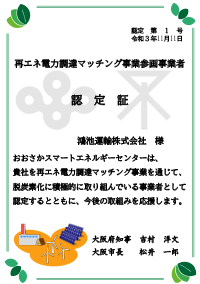
Eco-Conscious Driving
The KONOIKE Group was one of the first transportation groups to adopt eco-driving to reduce CO2 emissions. At locations that own vehicles, we strictly manage the fuel efficiency of all vehicles and continue to make efforts to reduce CO2 emissions. While eco-friendly driving is important, daily vehicle maintenance is another critical element of eco-driving. In addition, eco-driving means safer driving, since drivers learn to avoid abrupt braking, acceleration, and steering. We continue to consider and practice eco-driving as an effective means for ensuring transportation safety.
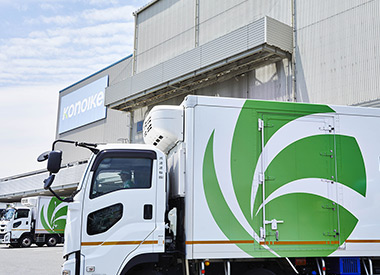
Adopting Low-Emission Vehicles
In light of recent major changes in the environment regarding resources and energy, we now feel a greater sense of social responsibility as a business operator involved in logistics. Part of this responsibility is to reduce our environmental impact. We are moving forward in the adoption of low-emission vehicles that emit less carbon dioxide (CO2) and the air pollutants nitrogen oxides (NOX) and particulate matter (PM).
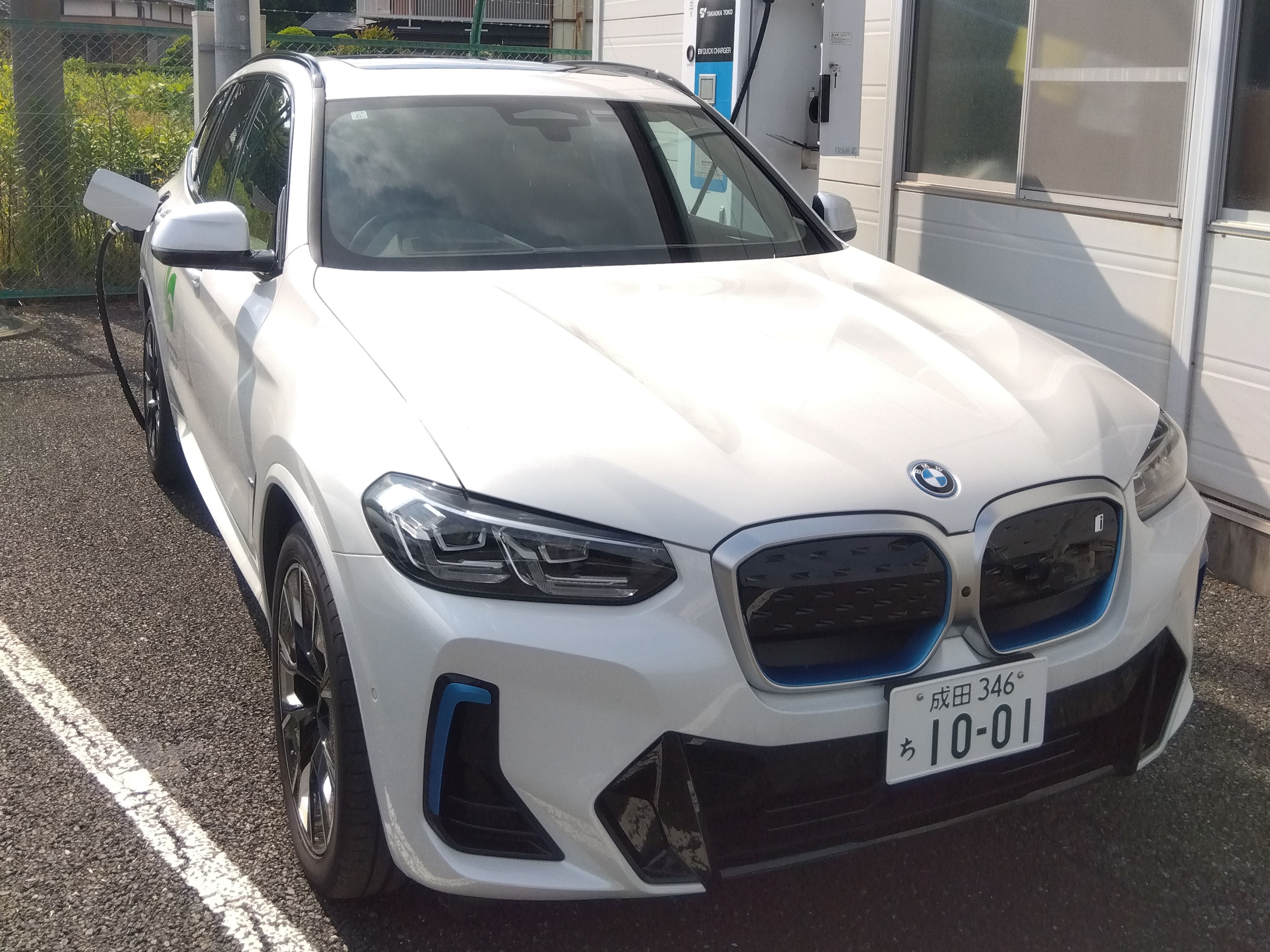
Hydrogen-Powered Fuel Cell Forklifts
In 2018, we became the first logistics firm to implement fuel cell forklifts. Currently, three units are in operation. Hydrogen forklifts generate energy and drive via hydrogen fuel, making them a superior performer for the environment. While in operation, they do not emit CO2 or other substances that have a negative impact on the environment. These forklifts are also very convenient as they can be fully fueled in about three minutes. Further, we generate the hydrogen using electricity from solar power, resulting in forklifts that are CO2-free.
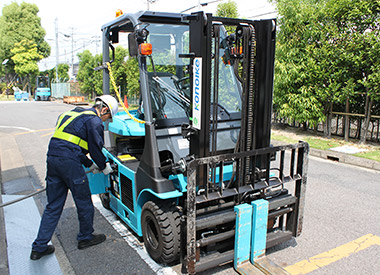
Utilization of Solar Energy
Photovoltaic arrays in 21 domestic locations and 3 overseas locations owned by the KONOIKE Group contribute to
the decarbonization of Earth by producing 14.7 GWh of renewable energy yearly. Additionally, the heat-shielding effects of solar panels mitigate increasing temperatures within our warehouses, resulting in an additional contribution to a lower carbon footprint at our logistics centers. Solar power intended for internal use will be standard equipment for newly established distribution centers. Batteries will enable the centers to store energy, so that surplus electric power can be used at night or sent to other locations. By such means, we aim to make the most effective use of renewable energy and contribute to the wider decarbonization of society.
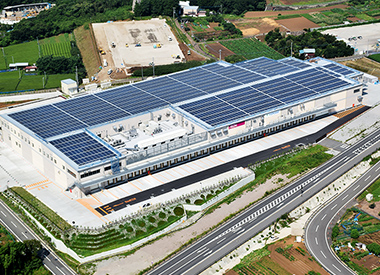
2. Businesses That Contribute to the Environment
Industrial Waste Recycling Business
At the KONOIKE Group, we are developing a recycling business for industrial waste aiming for both industry growth and environmental preservation. Group company Eco Innovation Inc. has built the Perfect Recycling System*, which effectively leverages customer-owned resources while generating zero waste. At ASR Recycling Kashima Co., Ltd., we established a unique system for retrieving resources from hard-to-separate industrial waste without producing any secondary waste. By leveraging limited, precious resources effectively, we support our customers’ businesses from an environmental standpoint and contribute to the global environment.
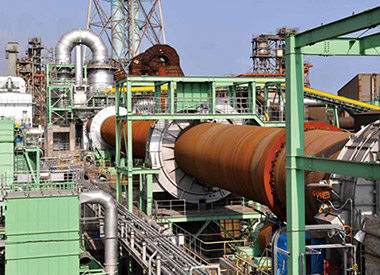
- Perfect Recycling System: A technique used for recycling industrial waste that contains iron, zinc, carbon, etc., without generating secondary waste. This system uses an RC resource circulation furnace to take waste that would have previously been disposed of via landfill and recycle it into good-quality iron/zinc resources. The Company contributes to the reduction of fossil fuel use and CO2 emissions by using industrial waste that would normally be incinerated. We also reuse gas emitted during processing.
Helping Customers Develop Infrastructure for Decarbonization
The KONOIKE Group provides engineering services based on our technical capabilities developed over many years through contracting work in a variety of industries. In our contracting work, we have recently seen an increase in inquiries for infrastructure development for decarbonization. We help our customers decarbonize by providing a diverse range of services, from the installation of solar panels to the production and installation of tanks and piping for biomass power plants, air pollution control equipment, and energy-saving related facilities.
Tank and piping work for a biomass plant that the KONOIKE Group was involved in
3. Providing Services That Reduce Environmental Impact
Modal Shifts
We are pursuing modal shifts as one activity to solve environmental issues through our business. By using railroads and ships for transportation instead of trucks, it is possible to significantly reduce CO2 emissions originating from long-distance transportation. Rail freight transportation is also an effective way to address a shortage of long-distance truck drivers. Additionally, there are benefits for customers, such as stable transportation schedules and reduced transportation costs. This is why we pursue logistics based on modal shift with such focus. Thanks to modal shift, we have generated about 8,427 tons in annual reduction impact for KONOIKE Group CO2 emissions. To further promote modal shift, we opened the new Tokyo Rail Gate Sales Office in March 2020. The sales office is located in Tokyo Freight Terminal, the largest freight station belonging to JR Freight. The site is close to Tokyo Bay and Haneda International Airport. For that reason, we are operating the sales office as a key base for modal shift in the KONOIKE Group. Many customers with ambitious environmental targets have begun requesting services from this sales office specifically to reduce their Scope 3 CO2 emissions.
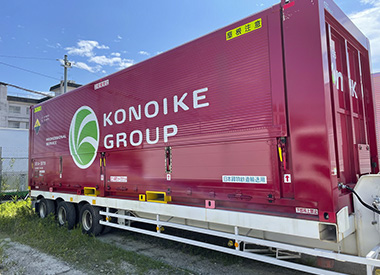
Using Tokyo Rail Gate to Promote Modal Shift
Thanks to modal shift, we have generated about 8,427 tons in annual reduction impact for the KONOIKE Group’s CO2 emissions. To further promote modal shift, we opened the new Tokyo Rail Gate Sales Office in March 2020. The sales office is located in Tokyo Freight Terminal, the largest freight station belonging to JR Freight. The site is close to Tokyo Bay and Haneda International Airport. For that reason, we are operating the sales office as a key base for modal shift in the KONOIKE Group. Many customers with ambitious environmental targets have begun requesting service by this sales office specifically because it helps them to reduce their Scope 3 CO2 emissions.
Railway Transport Business in India That Both Lowers Environmental Impact and Streamlines Logistics
In recent years, India’s economic development has been increasing and the country is in urgent need of a distribution network as social infrastructure. Trucks have become the leading method of land transportation. Therefore, transportation delays due to traffic congestion and the air pollution of exhaust gas have become major social problems throughout India. This has led to demand for modal shift. In response, in 2017 the KONOIKE Group launched a rail container transport business in India, the first such business by a Japanese company. Rail transportation offers a large capacity in a single trip and can reduce environmental impact in ways that contribute to the prevention of global warming. Currently, the construction of a freight railway between Delhi and Mumbai is underway as a national project. We hope to further improve our transportation capacity in India, further reduce our environmental impact, streamline logistics, and contribute to India’s economic development. As we do so, we are also striving to help prevent global warming.
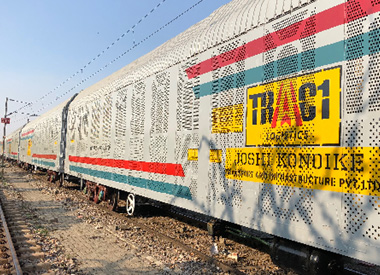
A car carrier train in India. A single train can accommodate approximately 300 small finished vehicles
Biodiesel Fuel From Waste Cooking Oil
The KONOIKE Group began using biodiesel fuel made from waste cooking oil. B5 biodiesel* can reduce CO2 emissions by 5% compared to diesel fuel and has been attracting attention in recent years as a fuel with low environmental impact. During FY3/2024, we used 97,712 liters of B5 biodiesel in trucks operating from four locations in Japan. We also took measures to collect and recycle waste cooking oil from employees’ homes. We began using B30 fuel* for one towing tractor in our Integrated Solutions Business at the Kansai International Airport facilities. This development marked the first-ever use of biodiesel fuel in a vehicle at the airport. We intend to increase the number of locations using biodiesel fuel to reduce CO2 emissions and make more effective use of resources.
- Diesel mixed with 5% or 30% biodiesel
4. Towards a Sustainable Society
Pursuit of the 3Rs and Green Procurement
The KONOIKE Group pursues the 3Rs (reduce, reuse, recycle) as a means to preserve resources. Each sales office establishes activities and targets, contributing to reducing environmental impact.
Each business location has set targets for green procurement, striving to choose products with the lowest environmental impact.
Endorsement of Government-Promoted Environmental Measures for a Sustainable Society, and Promotion of an Environmental Management System
The KONOIKE Group endorses and has registered with the national movement Decokatsu. Decokatsu is a government-wide campaign aimed at creating a new, enriched lifestyle that contributes to decarbonization. We are committed to promoting decarbonization through initiatives within our business activities and through efforts in the work styles and lifestyles of each employee.
In addition, as part of our efforts to address the issue of marine plastic pollution, we actively support the Plastic Smart Campaign and engage in ongoing initiatives, including the Yodogawa river clean-up activities and similar efforts at various locations.
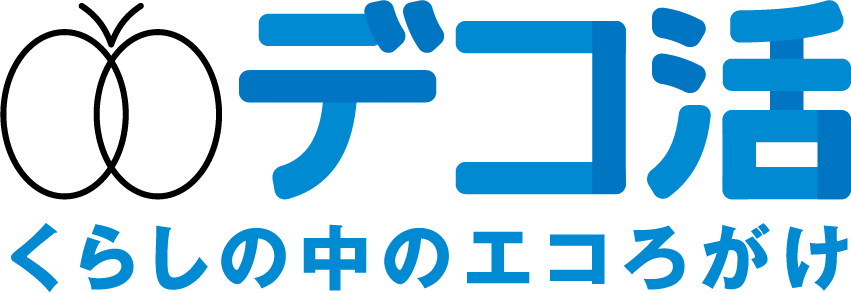
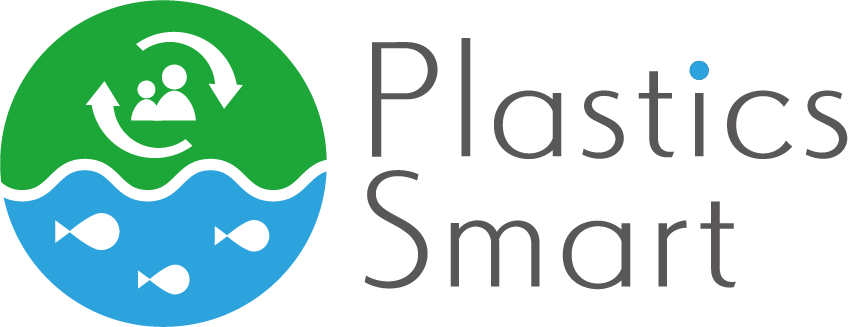
The group has acquired ISO 14001 certification and is working to reduce our environmental impact as required by international standards.
①
Company: Eco Innovation Inc.
Registration number: JMAQA-E304
Certifying entity: Japan Management Association, Quality Assurance Registration Center
②
Company: ASR Recycling Kashima Co., Ltd.
Registration number: JQA-EM6107
Certifying entity: Japan Quality Assurance Organization
.jpg)

We acquired the Green Management Certification offered by the Foundation for Promoting Personal Mobility and Ecological Transportation under the jurisdiction of the Ministry of Land, Infrastructure, Transport and Tourism. This is just one recognition of our work to ensure transportation safety and reduce environmental impact.
Organizations with Green Management Certification
Konoike Transport Co., Ltd. 36 offices Konoike Express Co., Ltd.
Japan Airways Co., Ltd. Konohana Transport Co., Ltd.
Kanriku Co., Ltd.
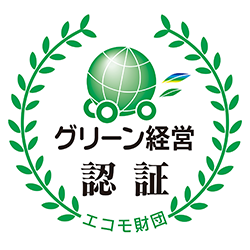
5. Biodiversity Conservation Activities
Biodiversity Conservation Activities in Osaka Bay
As a company founded originally in Osaka, we have been participating in the activities of an environmental conservation NPO to preserve the ecosystem of Osaka Bay since 2013. For example, we have been helping transplant eelgrass to Osaka Bay. Eelgrass is a type of marine plant found in coastal areas. Eelgrass beds provide habitats for a variety of organisms, offering an abundant source of plankton and other food for fish. These beds also provide an environment suitable for spawning fish and growing fry. Moreover, these beds absorb nitrogen and phosphorus, which facilitates eutrophication. This process improves the water quality of the surrounding sea area. However, the area covered by eelgrass beds has been shrinking due to development along coastal areas. Today, almost no eelgrass can be found in Osaka Bay. In response, the KONOIKE Group raises eelgrass seeds collected from Osaka Bay. The Osaka and Tokyo headquarters grow the seedlings between autumn and winter and transplant them back into Osaka Bay the following spring.
-
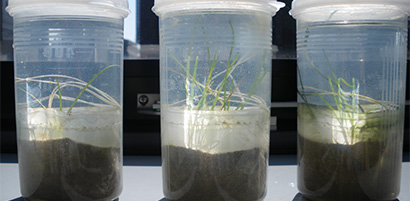
Raising Eelgrass Seedlings -
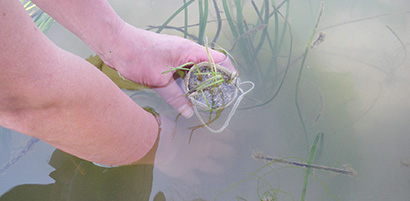
Transplanting Eelgrass -
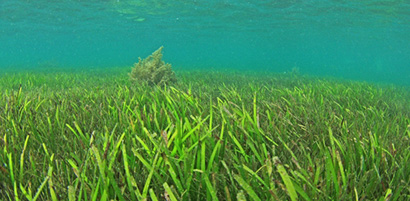
Eelgrass
Participating in the 30by30 Alliance for Biodiversity
The 30by30 Alliance for Biodiversity was established as a voluntary coalition of the Ministry of the Environment and other government agencies, corporations, and NPOs to achieve the domestic goal of 30by30, an international commitment to preserve 30% or more land and sea as healthy ecosystems by 2030. The KONOIKE Group agrees with the purpose of establishing the Alliance and will contribute to securing a healthy ecosystem and realizing a sustainable society through NbS*, which will lead to simultaneous resolution of economic, social, and environmental issues in the region.
- NbS: Nature-based solutions
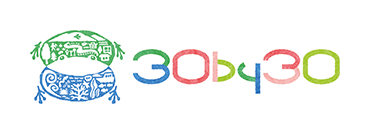
6. Our Community Initiatives
Yodogawa River Clean-Up Activities
The Yodogawa riverbed cleaning activity began in 2012 in the Denpo district (currently Konohana Ward, Osaka) which is the district where the KONOIKE Group was founded. Only 30 employees participated in the first cleaning activity. Now, nearly 200 people participate, including local residents. In recognition of the efforts of the KONOIKE Group, we received the River Protection Achievement Award* in 2020 from the Yodogawa River Office, Ministry of Land, Infrastructure, Transport and the Tourism Kinki Regional Development Bureau.
- River Protection Achievement Award: An award presented to individuals and groups who have been involved in river cleaning and protection activities over an extended period of time.
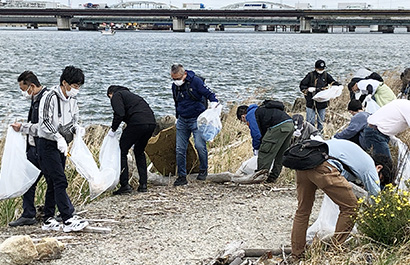
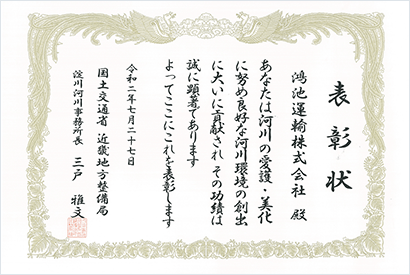
Edogawa Clean-Up Activities
Since 2018, the KONOIKE Group has been conducting clean-up activities in Edogawa, Tokyo, where the Group opened its first sales office. We volunteer in the Komatsugawa Senbon Cherry Blossom Festival and the Komatsugawa Senbon Cherry Blossom Lovers’ Association Tree-Planting Event where we clean up the area and fertilize cherry blossom trees. These events are organized by the Komatsugawa Branch Office of the Edogawa Ward Office Lifestyle Promotion Department and the Komatsugawa Senbon Cherry Blossom Lovers’ Association. The KONOIKE nameplate is hung from a cherry blossom tree at the venue, Oshima Komatsugawa Park. In June 2023, we received the 2023 Commendation for Meritorious Service to the Campaign for a Better Environment* from the Edogawa Ward for our efforts to date.
- The Commendation for Meritorious Service to the Campaign for a Better Environment is given to individuals and organizations that have made outstanding contributions to the development and spread of the Movement for a Better Environment, an environmental initiative in which Edogawa residents and the local government work together.

Beautification Activities Around Business Locations
At the KONOIKE Group, we conduct beautification activities around our 149 business locations nationwide as part of our local community contributions. These activities include regular cleaning of sidewalks, waterways, and other areas near our facilities. In FY 3/2024, a total of 9,680 participants contributed 1,364 hours to these efforts.
Some of these long-standing initiatives have been recognized by local governments, with letters of appreciation awarded for our contributions. Additionally, we collaborate with local residents and client companies in some of these activities, fostering stronger ties with the communities we serve.
Environmental Contribution Activities through Donations
The KONOIKE Group engages in various donation activities at its business locations nationwide. Representative initiatives include the Eco Cap Movement and Food Drive.
The Eco Cap Movement involves collecting plastic bottle caps and donating them to NPOs and other organizations. This initiative promotes recycling, reduces CO2 emissions, and contributes to medical support in developing countries, as well as employment promotion for people with disabilities and the elderly, through the proceeds from selling the caps. In FY 3/2024, we collected and donated 339 kg of caps, equivalent to approximately 150,000 plastic bottles. By recycling, we also prevented the emission of approximately 1 ton of CO2 that would have been generated during incineration.
The Food Drive involves collecting surplus food from households and donating it to local food banks and other support organizations for people in need, such as child cafeterias and welfare facilities. This initiative also helps reduce food waste. In addition to donations from employees’ households, the KONOIKE Group donates emergency food supplies stored at its business locations. In FY 3/2024, we conducted 18 donation drives, providing a total of approximately 1.3 tons of food.
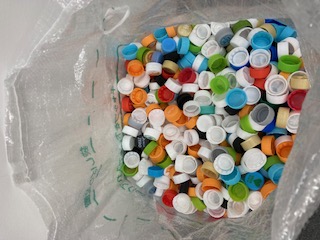
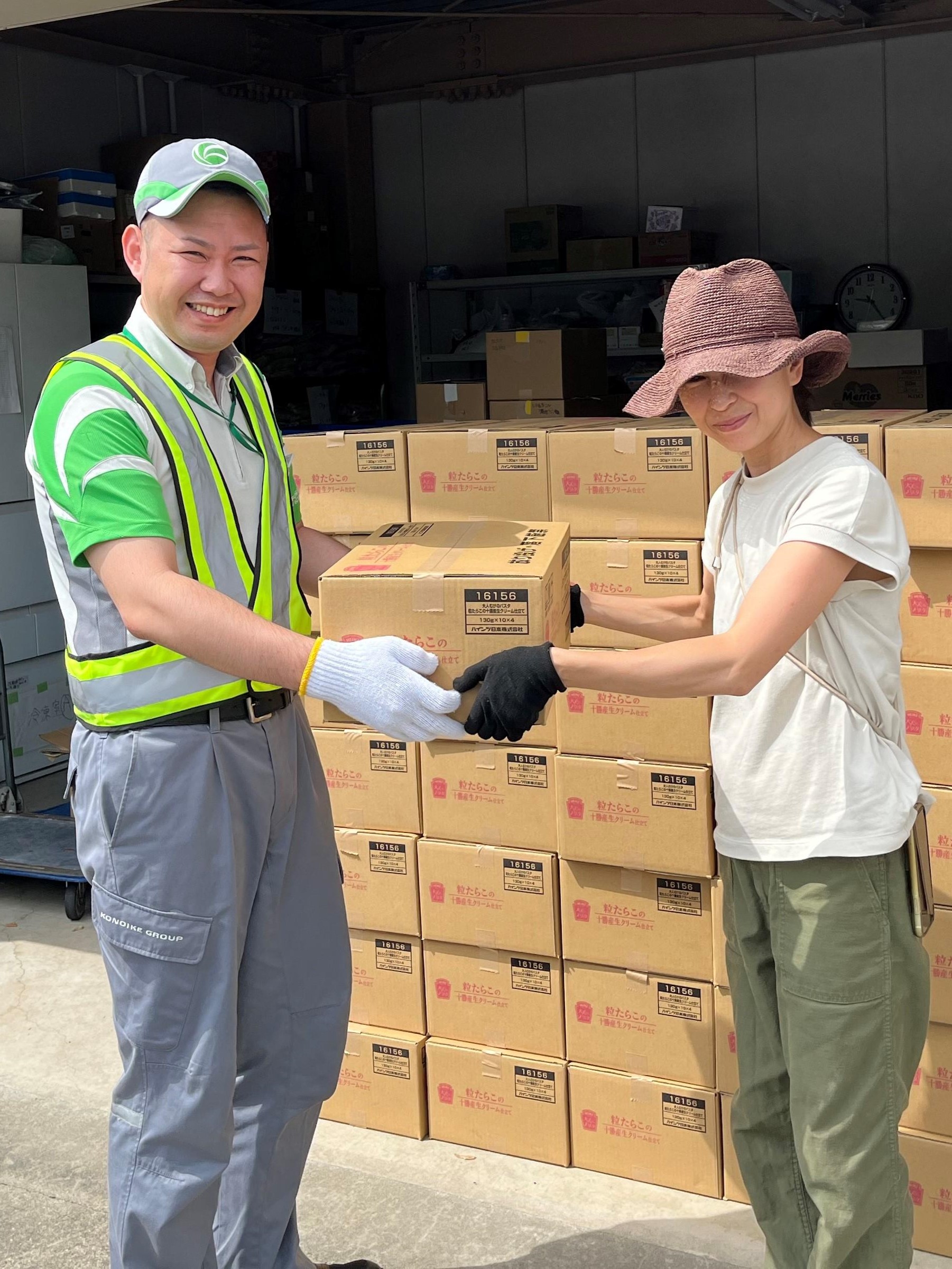
Other Community Contribution Activities
In addition to the contributions mentioned above, the KONOIKE Group engages in various community-based environmental initiatives, including greening activities through afforestation and other efforts.

